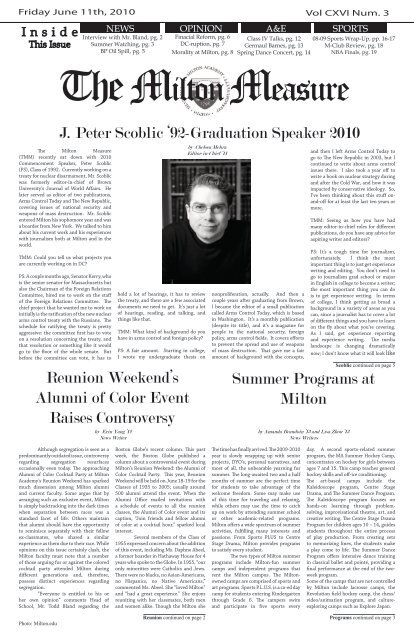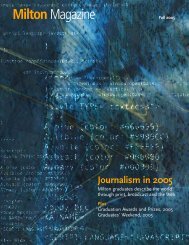Create successful ePaper yourself
Turn your PDF publications into a flip-book with our unique Google optimized e-Paper software.
page 4 | June 11th, 2010 News <strong>The</strong> <strong>Milton</strong> <strong>Measure</strong>Russian Adoption Gone Awryby Ashley Bae ‘12News WriterIn September 2009, seven-yearoldArtyom Savelyev from the Russiantown of Partizansk was adopted by U.S.citizen Torry Hansen. Six months later,Nancy Hansen, the adoptive grandmother,told the Associated Press that she andArtyom flew to Washington, where sheproceeded to send him back to Russia.Although many believe Hansen committeda sinful act, Torry and her mother assertthat their actions originated from puredefense.Nancy Hansen claimed thatin January, Artyom was checked by asocial worker, who reported to Russianauthorities that Artyom possessed noproblems. Despite the social worker’sclaim, the grandmother witnessed thechild’s fits of spitting, threatening,kicking, and hitting following thecheck-up. Nancy ardently rejectedassertions of child abandonmentby Russia authorities, claiming thatArtyom was supervised by a UnitedAirlines stewardess and escorted bya man who transported the boy fromthe Moscow airport to the RussianEducation and Science Ministry.<strong>The</strong> Kremlin Children’s Rights officereported that when Artyom arrived,he carried a letter from his adoptivemother, Torry, saying Artyom’s returnto Russia was necessary due to severepsychological problems. She wrote,“This child is mentally unstable. He isviolent and has severe psychopathicissues. I was lied to and misled bythe Russian Orphanage workers anddirector regarding his mental stabilityand other issues. After giving my bestto this child, I am sorry to say thatfor the safety of my family, friends,and myself, I no longer wish to parentthis child.” <strong>The</strong> grandmother Nancy alsostated in a phone interview that “he drewa picture of our house burning down andhe’ll tell anybody that he’s going to burnour house down with us in it. It got to [thepoint] where you feared for your safety. Itwas terrible.”Contrary to Torry and Nancy’sperspective, the Russian orphanagebelieves the adopting family was wrong inreturning Artyom. In fact, the orphanagethreatened to suspend all adoptionsof Russian children by United Statesfamilies. Russian Foreign Minister SergeyLavrov called the grandmother’s conduct“the last straw.” Apparently, many U.S.adoptions have gone wrong, includingthree in which Russian children have diedimmediately following their arrival inAmerica. In an interview with ABC Newsanchor George Stephanopoulos, RussianPresident Dmitry Medvedev stated thatthe boy “fell into a very bad family.” Inaddition, Medvedev commented on thesituation by saying, “it is a monstrousdeed on the part of his adoptive parents,to take the kid and virtually throw himout with the airplane in the oppositedirection and to say, ‘I’m sorry I could notcope with it, take everything back’ is notonly immoral but also against the law.”<strong>The</strong>se unfortunate cases have promptedoutrage in Russia where foreign adoptionfailures are prominent. <strong>The</strong> RussianEducation Ministry suspended the licenseof the World Association for Children andParents, a Renton, Washington-basedSpecial Olympics: Track and Fieldby Amanda Beaudoin ‘13News Writeradoption agency, for the duration of itsinvestigation.In response, the U.S. is alsotaking action. In Tennessee, authoritiesinvestigated the adoptive mother. U.S.State Department spokesman, P.J.Crowley, announced that “[they]’reobviously very troubled by it” whennotified of Artyom’s case. Crowley toldreporters that the U.S. and Russia sharea responsibility for the boy’s safety andthat Washington will work closely withMoscow to make sure adoptions arelegal and appropriately monitored in thefuture. Chuck Johnson, the CEO of theNational Council for Adoption, statedthat “child abandonment of any kind isreprehensible. <strong>The</strong> actions of this motherare especially troubling because analready vulnerable, innocent child hasbeen further victimized.” Oftentimes,adhering to morals and maintainingthe safety of one’s family is a struggle.Any possible freeze of Russianadoption could affect hundreds ofAmerican families. In 2009 alone, nearly1,600 Russian children were adopted byfamilies in the United States, and over60,000 Russian orphans have beensuccessfully adopted over the years,according to the National Council forAdoption, a non-profit U.S. adoptionadvocacy group. Although Hansen’sspecific situation may seem far-off,several <strong>Milton</strong> faculty members haveadopted foreign children in the past.<strong>The</strong> freeze of Russian adoptions has thepotential to affect our community aswell.On Sunday May 16, approximately fifty <strong>Milton</strong>students volunteered at the Special Olympics. <strong>The</strong>Special Olympics, lasting from 7:00am to 3:00pm, are aseries of athletic events where children and adults withspecial needs compete. <strong>The</strong> Spring Special Olympics was“Track and Field” themed. Some events included: sprints,high jump, long jump, softball throw, and more. Duringthe opening ceremonies, Mr. Bland gave a few remarks,and Olaitan Oladipo (class I) and Gabriella Sharpe (classI) sang the national anthem. After the ceremonies, the<strong>Milton</strong> Mustangs team ran to the torch, the coach lit it,and the games began.<strong>The</strong> role of the volunteers was very important.While they were responsible for cheering loudly, theyneeded to set up on Saturday and on Sunday morning.<strong>The</strong> day of the event, they also led each team ofathletes to a sign with their team name, which servedas the team’s ‘home base’; each team would leave theirbelongings next to the sign, and stand there to watchthe opening ceremonies and to await their events. Whentheir events were called, athletes would be guided by oneof the volunteers to a seat. When the heats were readyto begin, a volunteer, working as an escort, would leadthe athletes to the starting line. <strong>The</strong> whistle would blow,sending the athletes running or walking. At the finishline, six volunteers, each with his or her own lane, waitedwith stopwatches. <strong>The</strong> escorts would record the timeof their athlete and take him or her to the awards tentwhere first, second, and third place awards were given.Except for a little back-up at the awards tent, IsabelLester (Class II), who organized the Special Olympics,said that “the volunteers all did a great job in makingPhoto: Google (top) and <strong>Milton</strong>.edu (botom)the day run smoothly.” Although volunteering was hardwork, students were enthusiastic and eager to help theathletes. Without them, the Special Olympics would nothave been possible.Everyone should know that, as Isabel added,the “athletes were so happy to be there.” <strong>The</strong> athletesand volunteers all displayed permanent smiles on theirfaces. One athlete, Danny, memorable for many of thevolunteers, listened to Justin Beiber andtold countless girls, including MarjorieBurke (Class IV), that they were his “baby.”He told Marjorie that he “liked her hair, herheadband, her shorts,” and about everythingelse she was wearing. <strong>The</strong> athletes enjoyedwatching the events and generally interactingwith the volunteers. <strong>The</strong> volunteers werealso inspired by every moment spent withthe athletes. For example, Shannon Peters(Class IV) said that Danny’s “enthusiasmand friendliness had a really large impacton everyone; you really need to make aconnection with everyone there in order tohave a good time.”<strong>The</strong> Special Olympics meansmuch more than a fun day in the sun tohang out with your friends. As MallikaIyer (Class IV) said, “I had never worked inan atmosphere with people with special needs, and theSpecial Olympics really opened my eyes.” Like Mallika,many of the volunteers were new to working with specialneeds individuals. Although sometimes it was difficultand scary to work the athletes, they truly appreciated thevolunteers’ help. Overall, the Special Olympics, one of<strong>Milton</strong>’s most important community service events of theyear, was a great success and was inspiring to the athletesas well as to the volunteers. I encourage everyone to helpout next year.
<strong>The</strong> <strong>Milton</strong> <strong>Measure</strong> News June 11th, 2010 | page 5Long Term Effects of the BP Oil SpillBland Interview continued from page 1by Matt Chen ‘12 and Gina Starfield ‘12News Writer and News Editoryear is both consistent with what you’veheard so far, but also what students aresaying and wanting for the school.TMM: But at some point we must divergea little on issues of discipline, don’t youthink?TB: Maybe. I think there are timeswhere we may disagree. I have found inconversations about discipline though,and in going through the DC process, thatthere are more points of consistency thaninconsistency, there are more points ofagreement and disagreement. But in anycommunity, there are going to be morepoints of disagreements.TMM: Specifically along age lines?TB: I have found, in my conversationswith students, that there have been morepoints of agreement than disagreement.TMM: That these are the things we alldon’t want in our community?TB: Yes. What I would say, when we aretalking about rules in the community, allof the rules we have in the community, wehave for a reason – it’s not just because theadults want to enforce rules. That’s not apart of the job that I look forward to. Butat the same time, it is important for usto live in a healthy way as a community.What I have said in the past, the rules thatwe have exist for a reason, and if anyonein the community has issues with that, weshould talk about it and see where we are.<strong>The</strong> points of disagreement, I see moreas because there are a lot of opinionatedpeople in our community – you mayhave seen me describe the community as“beautifully opinionated.” What I wouldsay is interesting is that kids disagreewith each other about rules. It’s not justadult and child and adult and student –that’s a natural part about being in partof a community like ours – it’s going tohappen.<strong>The</strong> BP oil spill is theworst in US history and haseven surpassed the ExxonValdez spill according toestimates released on May27th (www.guardian.co.uk5/27). <strong>The</strong> most conservativeestimate shows the leak tobe 72 million liters so far,which is well in excess ofthe Exxon Valdez disasterof 42 million liters spilled in1989 (www.guardian.co.uk5/27). President Obama hascalled BP’s failure to stop thedamaging flow of oil intothe Gulf of Mexico “enragingand heartbreaking,” but thisdoesn’t even capture the epicproportions of this disaster,<strong>The</strong> spill originates from asea floor oil gusher, located40 miles southeast of theLouisiana coast, whichsuffered an oil well blowouton April 20th 2010. <strong>The</strong>explosion killed 11 platformworkers and injured 17 others;the catastrophe of the spillis, however, the grievouse nv i ro n m e n t a lharm it hascaused. Coastsof Louisiana,Mississippi andAlabama havebeen fouled by thespill and many saythe state of Floridawill be next. <strong>The</strong>summer beachesare already seeingchanges: sandappears cakedwith oil anddead animals areappearing onshores. Birds aredying in pools of oiland dispersants;endangered species in theGulf of Mexico face extinctionand migratory patterns ofbird and fish species havebeen irreparably altered. <strong>The</strong>Environmental ProtectionAgency admits it does notknow what the impact of thespill and the unprecedenteduse of dispersants to eliminatethe oil will be on wildlife.“We’re deeply concernedabout the things we don’tknow. <strong>The</strong> long-term affecton aquatic life is unknown”said EPA Secretary LisaJackson (ipsnews.net 5/31).Another concern caused bythe spill is the impact on thefood chain and the Gulf’secosystems. Researchers fromthe National Oceanic andAtmospheric Administration(NOAA) have detecteddeepwater oil plumes up to30 miles long, seven mileswide, and hundreds of feetdeep. (www.thedailygreen.com 6/5) According to NOAAresearchers, the foundationof the marine food chain—zooplankton, shrimp, corals,crabs and worms—will beaffected by the undersea oilwhich will have a disastrouslong-term impact on thegreater Gulf ecosystem(www.thedailygreen.com6/5). Furthermore, chemicaldispersants used to break upoil are trade secrets and havenot been examined by marinebiologists to determine theirsafety. Some scientists are alsoconcerned that tiny dropletsof oil left by dispersantswill be worse for the Gulfcoast’s marine life (www.thedailygreen.com 6/5).BP has attemptedmany measures to correctthe problem including theinsertion of a 4 inch widetube on May 14th, the “topkill” to try and cut off theflow of oil, and most recently,the containment cap overthe wellhead. Despite theseefforts, the oil continues toleak and looks like it will do sountil August. <strong>The</strong> disaster hasalready cost BP an estimatedamount of $ 990 million inclean-up costs. “Currently,there is no massive clean upplan with definite feasibility.Each state has been clearingits own coastlines, while twoUnited States Departmentof Defense C-130 Herculesaircraft were sent to sprayoil dispersant to alleviate thedamage. With more than 800ideas in proposal, the coastguard is still brainstormingand testing ways to clean upthe disaster. According to oilspill specialist Ed Overton,the pollution effects of thisoil spill can last for morethan 50 years. <strong>The</strong> federalgovernment has alreadydeclared a fisheries disasterfor the states of Alabama,Mississippi and Louisiana.<strong>The</strong> oil spill will notonly affect our minor summerplans of tanning and ourchoice of fish at dinner butwill have a long lastingimpact. Sincethe aftermathof the oil spillis expected tolast for fiftyyears, the oilspill will becomeour, along withour children’s,problem. In orderto lessen theburden for futuregenerations, wemust take greateraction now.Scoblic continued from page 1when you graduate from college.It will be important to maintain asense of flexibility about the formin moving forward.TMM: You mentioned that theworld of journalism is changing,and it just seems that it is vastlydifferent from how journalism waseven twenty years ago, with theincrease in online resources andsubsequently a decrease in profitfor newspapers.PS: I think it’s changed even inthe last five. Just while I was with<strong>The</strong> New Republic, the natureof the publication changed, notdramatically in terms of its missionor its quality, but in terms of theform that we were experimentingwith. It went from a weeklymagazine that was very heavilyfocused on its print edition, to abiweekly magazine that focusedon longer articles to develop. Ithad first a website that had somecontent, and then one with a lotof content that was really its ownpublication in some ways on a dailybasis, and of course now there’s aFacebook page and a Twitter feed.TMM: Do you think there’s anyfuture in paper journalism? Willit be not for profit, since there isnot enough incentive to pick up anewspaper like there used to be?PS: Basically, something hasto change in the way thatwe consume media. It’s notsustainable to have a modelwith a very expensive product– and news is a very expensiveproduct to produce, especially ifyou’re talking about investigativereporting – and people gettingit for free. Something happenedwhen the internet sprang intobeing. People developed a senseof entitlement that informationshould be free. It’s an impossiblesituation for the people whoproduce it. What you have now is alot of news organizations that areexperimenting with new models.<strong>The</strong> week I left <strong>The</strong> New Republic,we decided to put all of our printcontent behind a pay wall. I thinkthat if someone can find a modelthat works, we’ll be able to salvagea lot of what is incredibly valuableabout American journalism. Butconsumers do need to be willing topay for it, and they should pay forit, because it takes an incredibleamount of time, effort, and moneyto produce it.TMM: To get a little nostalgic, howwould you characterize your timehere at <strong>Milton</strong>? Did you perhapswrite for any <strong>Milton</strong> publications?PS: *laughs* I wrote for the <strong>Milton</strong>Paper, actually. I was a Senior Editorof the <strong>Milton</strong> Paper, which meant Iwrote some of the editorials. It wasin some ways a direct precursor towhat I wound up doing at <strong>The</strong> NewRepublic. My memories of <strong>Milton</strong>are actually incredibly fond. I,without exaggeration, made thebest friends of my life there andhad some incredible teachers. Itwas, and still is, a fantastic place.TMM: Without getting too muchinto your speech, what is your mainmessage to the Class of 2010?PS: I guess my main message tothe Class of 2010 is: be bold. Don’tbe afraid of failure, don’t alwaysassume that what your head tellsyou is more important than whatyour gut says. If there are thingsthat you want to do, do them now;don’t wait. In general, just be bravein going after what you want.Photos: Google
page 6 | June 11th, 2010 News/Opinion <strong>The</strong> <strong>Milton</strong> <strong>Measure</strong>Retiring and Departing Faculty<strong>The</strong> following members of the faculty will be retiringor departing at the end of this year. We would like tothank them for their services to the school and wish themall the best in their future endeavors.<strong>The</strong> Full NelsonA Column by Nelson Barrette ‘13Your mother probably told youto avoid seven words; we’ll skip thesefor the moment. Instead, let’s focus on aslightly larger linguistic issue: the gradualimplosion of the English language. <strong>The</strong>problem is not so much our tendency toconfuse “flout” and “flaunt” or totally ignorethe distinction between “will” and “shall,”errors which only an English teacher wouldpoint out. Instead, the problem lies in ourhabit of using synonyms interchangeablyand ignoring the sometimes not-so-subtledifferences in their meanings.<strong>The</strong> manipulation of words ismore than intellectual; it is social. Take, forinstance, the nouns “lie” and “inaccuracy.”I’ve heard both of these words used in thesame context, but they actually have verydifferent connotations. Say your historyteacher points out an “inaccuracy” in youressay. It’s not such a big deal; maybe youwrote that Henry VIII had eight wives orthat the Battle of the Bulge effectivelyended the Vietnam War. Imagine, however,if your teacher found a “lie”—a statementintended to deceive— in your paper.All of a sudden, your innocent mistakehas morphed into a deliberate attemptPhotos: Facebook.comJesus Lopez DiezJane McDonaldChandra LombardAndy McBrianLisa NussbaumJudy PordesHope RupleyAaron WhitmoreFaculty on Sabbatical<strong>The</strong> following members of the faculty will be on sabbaticalnext year, either in the fall or in the spring, or for the fullyear. We wish them all the best as they head off to pursuetheir goals and interests, and anticipate their return oncampus after their time away.Fall:Mark ConnollyAnn FosterSpring:Peter KahnVictor LlacunaPaul MennegKim SamsonLaurel StarksFull Year:Keith Hiles-PilantLexicon of Sorrowby Penelope Reichenhall ‘13Opinion Writerto mislead the instructor, and you’recaught between responding indignantlyto this attack on your character, orshaking with terror at the thought ofpotentially appearing before the DisciplineCommittee.Look at another pair of frequentlytransposed words: chide and rebuke. Ifyou’re chided, you’re gently scolded for,perhaps, breaking a beaker in the chemistrylab. A rebuke is a much harsher criticism;you’d be rebuked for exploding sodiumpellets in water. <strong>The</strong>n, of course, thescience trailers would probably ignite andyou’d be expelled. Or killed. <strong>The</strong> feeling youhave after you’ve been rebuked is certainlydifferent from what you feel after you’vebeen chided, so why would you use thesewords interchangeably?Words can even lead to violence.Imagine that someone makes a minorsocial blunder and, instead of telling himthat he is “responsible” for this mistake,you tell him that he is “guilty.” Tensionsboil as you transform a mild criticism intoan accusation. Taking it one step further,you inform this person that, instead ofcommitting a gaffe, he has made a “stupid”Sorrow continued on page 7Financial ReformOn May 20, the Senate passeda sweeping reform of the United States’financial regulatory system by a voteof 59-39. <strong>The</strong> bill lowers the amount ofdebt financial firms can have withouta requisite amount of capital, givesregulatory agencies like the FederalReserve and the Securities and ExchangeCommission (SEC) more power towatch the trading of complex financialinstruments, and allows the governmentto take control of and dismantle failingfinancial firms, which the FederalDeposit Insurance Corporation (FDIC)is currently able to do only with normalbanks. <strong>The</strong>se measures are similar, butnot identical, to those adopted by theHouse on December 11 of last year.Both bills include proposals for a newconsumer protection agency to haltunscrupulous lending, which led to theproliferation of sub-prime mortgagesand helped to cause the financial crisis.In addition, both the House and Senatehave proposals to ensure that derivativeslike credit default-swaps, which hada large role in the credit-crunch, aretraded on the open market.<strong>The</strong> necessity of these strongreform measures is clear; the financialcrisis and the ongoing recession areclear consequences of a poorly regulatedfinancial system, which misleadconsumers, stymied efforts at effectiveregulation, and allowed banks to takeon more debt than reasonable. Whatis most amazing, however, is that evenafter the terrible consequences of thecurrent system’s loop-holes have beenbrought to light, the bill has facedserious resistance. Though Wall Streetfinancial institutions and their lobbyistsare the most high-profile culprits behindthe opposition, the leadership of theRepublican party has also launched whatappears to be a concerted campaignof misinformation against reform.Before the bills’ passage, Senator MitchMcConnell of Kentucky, the SenateMinority Leader, made the argumentthat the Democrats’ plan would createmore bailouts; as evidence, he citedthe existence of a $50 billion fund inthe Senate bill, which would be usedfor the liquidation of failing financialentities. What Senator McConnell failedto mention was that the fund would beentirely made up of fees collected frombanks, and that the express purposeof the fund and the related take-overprovision was to eliminate the type ofbailout which became such a flashpointissue during the credit crisis. Becausethe bill allows the FDIC to take controlof banks and other firms before theyreach the point of total insolvency,thus allowing the government tosalvage some money from the sale ofthe failing institution’s assets, the daysof gigantic bailouts without tax-payercompensation would be over. Though theDemocrats later dropped the proposedliquidation fund in what amounted toan unproductive bit of politicking, thereis still more room for the governmentto compensate the American people forthe seizure of a financial institution.But the elimination of the fundhas more frightening portents for thefuture of financial reform, apart fromthe Democrats unfortunate affinity foruseless compromise. Because the Houseand Senate bills have some differences,they still need to be reconciled beforePresident Obama can sign legislation.Thus, there is still far too much room forthe kind of posturing which led to thetruncation of the liquidation fund, andkey measures may be lost in the shuffle.One of the more controversial issues atstake is a proposal by Senator BlancheLincoln of Arkansas, which wouldwithdraw a banks’ credit line fromthe Federal Reserve if it brokered ordealt in derivatives. Though seeminglyharsh, this is a necessity because of theinstability caused by banks which workwith both commercial transactionsand complex derivative trades. Firstly,institutions with dual interests areliable to stretch their debt burdens tothe limits of conceivability. Secondly,banks which provide a needed lineof credit to businesses are heavilyundermined if their riskier investmentsin tricky financial instruments causetheir implosion, thus threatening thelivelihood of the businesses that theyfinance. Moreover, under the Senatebill, there would still be a possibilityfor commercial banks to maintainsubsidiaries that deal in financialinstruments, so the banks would not belosing out as much as they claim.<strong>The</strong> reform bills passed bythe Senate and the House providenecessary safeguards against a furthereconomic crisis. But real reform is stillin danger of being badly watered downby the political maneuverings of bothparties. Strong and consistent measuresneed to be kept so as not to repeat thecurrent crisis, and to nurture a healthierfinancial environment.
<strong>The</strong> <strong>Milton</strong> <strong>Measure</strong> Opinion June 11th, 2010 | page 7DC-ruptionby Mollie Welch ‘12Opinion Writer<strong>The</strong> Importance ofSolitudeLate spring is my favorite time ofyear: on June 11th school gets out, June13th is my birthday, and best of all, earlyJune is when the temperature finally startsfeeling like summer. But with spring comesirresponsibility. As the end of the yearapproaches, we become more impulsiveand less conscientious. We have mentallymoved past thoughts of Term Papers andDYOs, and our minds settle into a state ofliberation. School rules feel more oppressivethan they did in November, or even March.As summer approaches, we tend to overlookschool policies, and many of us assumethat the faculty and administration areoverlooking these policies as well. <strong>The</strong>y arenot. In the past five years, spring has beenthe season for disciplinary action. <strong>The</strong>rehave been upwards of twenty DCs (shortfor disciplinary committees) since March,and numerous Deans Committees (whichare not publically announced) as well.<strong>The</strong> Deans Office’s mantra for this springwas Rejuvenation: rejuvenation in grades,attitudes, and actions. If students end theyear on a high note without regrets, theywill enter summer happily. <strong>The</strong>y will be ableto look back on the year positively and theirparents can be proud of their achievements.This attainable glorious state shouldideally lead students to exercise their bestjudgment in the year’s final stretch, andto make good decisions. Regrettably, asof late, much of the student body has notmade good decisions, and many have beencaught. Some broke school rules as acts ofdefiance, while others became victims ofthe carefree spring state-of-mind and wereled astray by it. Regardless of the individualmotives behind the transgressions, theseDCs have affected us all. <strong>Milton</strong> is a cohesivecommunity, and although only a few havebeen suspended, the damaging blow ofeach disciplinary instance is collectivelyfelt by all. In the dorms, hallways, andathletic fields, silence echoes in the placeof our temporarily—and in a few casespermanently—lost comrades.Each year in the final months ofschool, <strong>Milton</strong> students work continuouslyand seemingly endlessly. But then all of asudden, the work and stress subsides, asyou realize that there are only four days leftuntil freedom. <strong>The</strong> end of the year comes asa shock and a relief. Part of you has beenwaiting all year to drive away from <strong>Milton</strong>.Yet amid the onslaught of assignments andapplications that rages between March andMay, many of us lose track of the passingweeks, and often graduation comes as asurprise.Stress is the ever-present evilthat creeps into and takes over the livesof <strong>Milton</strong> students. When we are stressed,we are more likely to let off steam inuncharacteristic ways, many of whichinclude breaking school rules. <strong>Milton</strong> isan institution where its students musttake responsibility for their actions, andtherefore violations of the Handbook willalways merit a suspension, regardless ofwhether they were induced by stress, angeror simple bad judgment. <strong>The</strong> majority ofthis spring’s DCs seem to have resultedfrom rebellion, stress or boredom. I believethat the in order for the student body toreduce the frequency and quantity of futuredisciplinary committees, it is importantthat the entire community be aware ofthe underlying causes of the offenders’actions. Perhaps the administration couldfacilitate the painting of a clearer pictureof these causes by providing the assembledmasses with more detailed accounts in DCstatements. Though the statements areread to prevent misinterpretation, theirambiguous wording often spurs morerumors than the statement serves tosilence. Yet although this ambiguity maylead to the circulation of false assumptionswithin the student body, such gossipis prolonged by students’ failure to askquestions. <strong>The</strong> blame for many of therecent DCs has been placed on a just a fewstudents. Some people feel that it is unfairthat these people were caught just becauseof another person. What the students failto realize, however, is that anyone whogets DCed was wrong in the first placefor not abiding by school rules. Thoughit may be another student’s fault that anoffender is caught, such circumstancesdo not excuse the offender’s misbehavior;such circumstances do not remove fromthe offender the responsibility for his orher own actions.Spring is fantastic and can be alot of fun, but we need to understand thatthe choices we make now will impact us forthe rest of our <strong>Milton</strong> careers and oftenbeyond. More importantly, they affect ourloved ones and the <strong>Milton</strong> community as awhole.Spending time alone is a ritualthat I believe can be of great importanceand is worth daily consideration. Solitudeenables the individual to assume apeaceful mindset, and grants one thechance to examine emotions thatwould otherwise be loss in the hubbubof day to day activity. It is throughsuch careful introspection that certaininternal struggles can be dissected andunderstood under the transparent scopeof unhindered mental focus. Predictably,the majority of people spend hours eachday alone, cooped up in their rooms,blasting music and surfing the Internet.This type of seclusion, however, is nottrue solitude. Consider sitting in yourroom for ten minutes, alone. Instead thechaos and distraction of technology orentertainment, there is silence. Your eyesare closed, and your mind, wide open.Those who venture to “Meditation Club”seem to understand the importance ofthis type of solitude, and its potential toeradicate unwanted emotional baggagethrough deep relaxation. Meditation isnot the only way to achieve an inner peaceand mental catharsis. In my opinion,any time spent entirely alone with one’sthoughts can impart internal tranquilityand, at times, mend severe emotionaltrauma. For me, playing guitar is theoutlet that allows me to cleanse my mind,while for others, whimsical writing may dothe trick. Solitude is a universal panacea.According to Dan Schwartz (II), “timespent alone gives one the opportunityto examine the meaning of time spentwith others.” With no outside influencesbombarding our ears and influencing ourdecisions, silence quickly imparts state ofZen which infuses the mind with serenity.This calm will slowly seep through one’sbody, soaking into the skin until a relaxedtranquility encompasses his or her entireby Brandon Daly ‘12Opinion Writerbeing. Solitude is truly a daily necessity!I may preach the importance ofseeking solitude, but I understand thatfew of us have the opportunity to pursuea peaceful Buddha-esc existence. Whois going to use free time to examine lifewhen homework and friends are waiting?When faced with the decision, almost allchoose “fun” over a ‘valuable cleansingexperience’. When was the last time youchose to go to a museum over the zoo oroutdoor skating rink? Sitting in a roomalone may sound entirely boring andeven somewhat depressing; thus, it is notan activity many frequently choose topartake in. A warm surprise is in store forthose who give solitude a chance. Aftertaking ten or twenty minutes to clear mymind completely, I feel as if an intangibleweight has been lifted from my shoulders.Freeing my mind in this way gives methe opportunity to hone in on what’struly important, and detach myself fromthe negative external influences thatare engrained in our subconscious. Ourspongy minds are constantly overrun byadvertisements, music, and friends, andit’s easy to lose sight of our true, corevalues and beliefs. Time spent in solitudegives each of us the chance to stay intouch with our buried emotions, andremain true to our respective “Selves.”Solitude is so important becauseit allows us to find harmony with theelements of life that are generally puton hold. Now, I do not expect readers toengage in spiritual quests each day forthe rest of the year, shut away in solitudefor the sake of the almighty Zen. I begyou to try to take twenty minutes eachweek to empty your mind of relativelyinsignificant worries, and find a moremeaningful dogma to live by. You will notregret it.Sorrow continued from page 6error. Now you’ve accused him of being “guilty of stupidity,” and you and he are about toresort to blows or, at the very least, a loud argument.<strong>The</strong> misuse of words also has an adverse effect on writing. Similar words arelike shades of a palette; if all synonyms were used interchangeably, the palette wouldbe smeared, and the subtle beauty and intensity of the florid writings of James andFaulkner or the minimalist writings of Hemingway and Wolff, would be turned tomuck.Ironically, one unintended evil is the thesaurus. As a “good” writer, you tryto avoid repetition when writing papers, so naturally, you turn to the trusted Roget’s<strong>The</strong>saurus. Unfortunately, you then end up using a string of similar words as if they allhave the same meaning, when in actuality, they may have very different connotationsand as such completely change the tone of your paper.For example, I opened my thesaurus to the word “heathen” and found thesynonyms “pagan” and “infidel.” <strong>The</strong> term heathen was coined by missionaries to referto a poor, benighted non-Christian. A pagan, on the other hand, refers specifically tothe polytheistic Greeks and Romans. In other words, a heathen is the one who justput the poison dart in your shoulder, while the pagan is the toga-clad Roman takingpart in massive orgies while sipping wine. An infidel is totally separate from both andwas traditionally defined by Europeans as a non-Christian of a powerful religion thatthreatened Christianity, such as Islam.Flipping through more pages, I came to the word “egotist,” which (accordingto Roget) is a synonym for “egoist,” “narcissist,” and “misanthrope.” An egotist iscompletely inflated with his own self-importance and will recite every last detail of hislife to you ad nauseum. An egoist, however, believes that it is only ethical to put himselffirst. A narcissist is so deeply in love with himself that he may not want to talk to you atall; he might just invite you to join his fan club. A misanthrope is completely differentfrom all three; he’s the one who you’ll find snarling at you and the rest of humanity fromthe confines of his hermit retreat.We could just ignore the subtle differences of these so-called “synonyms,” but itwould be to the detriment of our language. Ultimately, it’s up the reader to decide whichis better. Look at this skillfully crafted, acerbically witty retort, from Moliere’s 1666 play<strong>The</strong> Misanthrope:“Madam, I think we either blame or praiseAccording to our taste and length of days.<strong>The</strong>re is a time of life for coquetry,And there’s a season, too, for prudery.When all one’s charms are gone, it is, I’m sure,Good strategy to be devout and pure:It makes one seem a little less forsaken.Some day, perhaps, I’ll take the road you’ve taken:Time brings all things. But I have time aplenty,And see no cause to be a prude at twenty,”Have we really achieved a superior existence with our modern day equivalent: “YourMOTHER!”?
page 8 | June 11th, 2010 Opinion <strong>The</strong> <strong>Milton</strong> <strong>Measure</strong>According to the BBC, Applerecently surpassed Microsoft as thelargest technology company in the world.Apple’s success has been due in part to itsever growing lineup of handheld mediaplayers, including iPods, iPhones, and nowthe iPad. Apple has succeeded due to itsextensive market strategy combined withits user friendly interfaces and innovativeproducts. However, Apple’s image hasrecently been stained by news of a stringof suicides at a Taiwanese owned factorythat Apple contracts to produce theirproducts.<strong>The</strong> Foxconn factory in Shenzhen, Chinais the largest final assembler of mobilephones in the world, according to Labornotes. <strong>The</strong> factory assembles phones forSony, HP, Nokia, and Dell, as well as Apple.<strong>The</strong> enormous demand for Apple products,including iPads, has caused a largeincrease in demand for these factories inrecent months. This increase in demandmay have been fatal. All of those whokilled themselves were between 18 and24, and were primarily migrant workerscoming from south Asia. <strong>The</strong> situationhas become so bad, that, according toCNN, Foxconn has placed nets around theDying for an iPadby Stewart Pollock ‘12Opinion Writerworkers dormitories to prevent them fromleaping to their deaths. <strong>The</strong> severity ofthis problem, coupled with Apple’s vagueand ineffective response is indicative ofthe inherent risks and dangers in usingsweatshop labor to cut costs.<strong>The</strong> suicides seem to have been causedby severe working conditions and hugeamounts of stress on workers. <strong>The</strong> familyof one worker told the Shanghaiist newsagency that the worker killed himselfafter being forced to work a 34 hour shift.Shanghaiist also obtained video footagethat showed several factory guards beatingup a worker outside of the factory. It isclear that Foxconn’s policies led directlyto the deaths of these workers, and thecompany’s current anti-suicide policiesare not working. Foxconn, in an apparenteffort at damage control, recently madeall of its employees sign waivers thatstated “In the event of non-accidentalinjuries (including suicide, self mutilation,etc.), I agree that the company has actedproperly in accordance with relevantlaws and regulations, and will not suethe company” That Foxconn would evenrequire employees to sign such a waiver isindicative of the severity of the situation.Unsurprisingly, both Apple and Foxconnhave publicly been keeping quiet aboutthe suicides. <strong>The</strong> original Mandarin textof the waiver was leaked by Hong Kongnewspaper Ming Pao and Foxconn onlyrecently acknowledged its authenticity.Apple and Foxconn’s efforts to preventdeaths, including a 30% salary increase,are steps in the right direction, but theyare not enough. A fundamental shiftin the management style and requiredworkload will be necessary if this epidemicof suicides is to be stopped. One mistakethat Apple cannot continue to make is totry and sweep this under the rug. SteveJobs, in a recent email exchange withlabor organizers LaborStart, attemptedto downplay the Foxconn deaths bystating “Although every suicide is tragic,Foxconn’s suicide rate is well below theChina average”. He then assured that“We are all over this.” While 12 out of300,000 workers committing suicide isindeed below the Chinese average, it doesnot somehow make the deaths any lessdisturbing. That almost all of the workerskilled themselves by jumping out of thedormitory complex is itself indicativethat there is something wrong with theworkers conditions.On their website, Apple states that they“insist that [their] suppliers provide safeworking conditions” and “treat workerswith dignity and respect.” <strong>The</strong> Foxconnscandal calls into question how stringentApple is being with their suppliers aboutworker safety. Apple must demonstratethat they are truly working with Foxconnto provide counseling for workers andlimiting work hours. Unless they do so,they cannot rightfully claim that they onlyuse responsible suppliers.In late May, according to local Chineseauthorities, a thirteenth worker attemptedsuicide. <strong>The</strong> man, whose surname wasreleased as Chen, was taken to a hospitalafter he attempted to slit his wrists.This attempt came hours after FoxconnChairman Terry Gou toured the facilitywith journalists showcasing new efforts toprevent suicide. It is clear that Foxconn’scurrent methods are not working. IfApple and Foxconn do not attempt real,lasting reform, they will be responsiblefor numerous human casualties, andpreventable losses at that.Morality at <strong>Milton</strong>Amateur:Sodokuby Robert Bedetti ‘11Opinion WriterThis year marks the first of a newdecade. With a new Headmaster, UpperSchool Principal, and Academic Dean,<strong>Milton</strong> is undergoing major changes inleadership. As this transformation takesplace, the voice of the student body isespecially important. We must consider<strong>Milton</strong>’s core values and establish goalsfor the coming decade. As Head Monitor, Ihave thought much about my own goals forthe student body, based on the overarchingvalue of morality.First, honesty should be the bestpolicy in the eyes of everyone at <strong>Milton</strong>.We all know (I hope) that <strong>Milton</strong>’s motto is“Dare to be True,” but how do we manifestthis idea? Honesty is often limited to nottelling lies, but our motto and our valuesshould encompass far more than that. Weneed to be more honest with ourselves.<strong>The</strong> first step to being a moral citizen isrecognizing the importance of day-to-daydecisions, and examining whether or notthey reflect your true character or someoneelse’s expectations. Nothing justifiesdishonesty, whether lying to a teacher, afriend, or yourself.Everyone at <strong>Milton</strong> is a part ofthe <strong>Milton</strong> community. Whether you loveeverything about the school, dread yourdaily arrival, or don’t even go here, anyonewho enters our campus influences andrepresents it in some way. We are inevitablya group of individuals, but a valuablemember of the community must have morethan just a sense of individuality (whichI don’t believe we’re lacking), but also anunderstanding of the community and his/her impact on it. If someone sees a pieceof trash on the quad and keeps on walking,that person is saying something about ourschool. A statement is also being made byanyone who witnesses this environmentaltransgression and chooses not to say or doanything about it.Sodokus: GoogleWe make a similar statement when weassume a play will be terrible becauseit’s student directed, or when we think afootball game will be boring because wedon’t really understand the sport. <strong>The</strong>statement is this: we don’t care. Maybe wereally don’t care, but we should. You mightnot find girl’s hockey entertaining, butyou should consider the perspective of theplayers. Maybe if you try going to a gamewith your friends (shirtless), paintingyour chest, face, and back, and cheeringwildly at any and every lull in the action,you will find yourself having a great time.Sometimes, when you do things for otherpeople—a friend on a team, a peer in aplay, or someone you don’t even know buthas to clean up your trash—you end upfeeling better about yourself.Honesty and self-sacrifice are both greatideals, but neither can come to fruitionwithout a conscious effort. <strong>Milton</strong> offersa plethora of unique opportunities, andone obviously cannot take advantage ofall of them. It is important, however, thatwe take advantage of what our so oftensubdued instincts encourage. Surely, wewill be better people and <strong>Milton</strong> will be abetter place if we accept this responsibilityand encourage others to do the same. <strong>The</strong>reis no legitimate reason for not being thebest you can be, nor will anyone expect anymore of you.As Head Monitor, I like to believe that I havesome influence on the <strong>Milton</strong> community,in particular the student body. I consider itmy responsibility to do more than just bean organized, approachable leader, but alsoset an example for the entire communitythat I hope will be honest, considerate, andultimately the best I can offer. My maingoal for the upcoming year is to be able tosay that I led a school full of more than justgood students, good athletes, and goodmusicians, but one full of good people.Difficult:
<strong>The</strong> <strong>Milton</strong> <strong>Measure</strong> Pictures June 11th, 2010 | page 9Pritzker Science CenterPhotos: <strong>Milton</strong>.edu and tour of Science Building
page 10 | June 11th, 2010 Centerfold <strong>The</strong> <strong>Milton</strong> <strong>Measure</strong>Faculty Look-a-LikesStraight from the MugbookFlewelling, HeatherSocial Awareness Coordinator170 Centre St.<strong>Milton</strong>, MA 02186Cell: 617-435-0887Email: Heather_Flewelling@<strong>Milton</strong>.eduR onaldinhoBrazilian FootballerRio de Janeiro, BrasilHome: 617-325-9388Email: Ronaldo_de_Assis_Moreira@<strong>Milton</strong>.eduCannata, PaulMA Hockey Coach/Legend170 Centre St.<strong>Milton</strong>, MA 02186Home: 617-364-6225Email: Paul_Cannata@<strong>Milton</strong>Hockey.eduMoore, StevenInterim Chief Financial OfficerN/ANeely , AnneVisual Arts170 Centre St.<strong>Milton</strong>, MA 02186Cell: 603-531-1545Email: Anne_Neely@<strong>Milton</strong>.eduSarandon, SusanActressHollywood, CAHome: 617-333-9391Email: Susan_Sarandon@<strong>Milton</strong>.eduB anderob, J ohnCertified Genius170 Centre St.<strong>Milton</strong>, MA 02186Cell: 339-222-0534Email: John_Banderob@<strong>Milton</strong>.eduE ins tein, AlbertCertified Genius<strong>The</strong> Einstein HouseMunich, GermanyCell: 339-222-0519Email: Albert_Einstein@<strong>Milton</strong>.eduB all, DavidUpper School Principal Elect170 Centre St.<strong>Milton</strong>, MA 02186Cell: 617-939-4752Email: David_Ball@<strong>Milton</strong>.eduAllen, WoodyJack of All TradesHollywood, CACell: 617-543-8786Email: Woody_Allen@<strong>Milton</strong>.eduPhotos: <strong>Milton</strong>.edu and Google
<strong>The</strong> <strong>Milton</strong> <strong>Measure</strong> Centerfold June 11th, 2010 | page 11Top 11 Things To Do Before You Graduate From<strong>Milton</strong> <strong>Academy</strong>11. Observe a flagpole run10. Go to the Health Center and ask for a condom9. Hold a door for Mr. Bland8. Start your own DC Statement with a knock knock joke7. Play the face game with the Math Department6. Pull an emergency chemical rinse lever in the newPritzker Science Building5. Witness a faculty basketball game4. Sneak out of your dorm while you’re supposed to bepainting it3. Table-top a campus security officer directing traffic2. Take a bite out of every partially grilled Panini sandwich1. Join the Harkness Society
page 12 | June 11th, 2010 A&E <strong>The</strong> <strong>Milton</strong> <strong>Measure</strong>Why Gospel Choir Rocksby Olivia Atwood ‘13A&E Writer<strong>The</strong> gospel choir, led by Ms. Dow,performed for students during secondperiod on Wednesday. For those whodidn’t attend, I’m sure you heard thatit was a great performance, filled withpowerful vocals and excellent music. But,if I am correct in thinking this, most of youdidn’t dwell on the matter very long, and,in most cases, didn’t give the assemblymuch thought. I went to the assembly andnot only was I utterly blown away by thevoices of the choir’s members, but I alsorealized the top reasons why I want tohear more of gospel choir’s power-packedtunes in the coming years.1. THE MUSIC. If you didn’t go theassembly, you seriously missed out onsome quiet, moving melodies and somejaunty, upbeat tunes. <strong>The</strong> assemblystarted with a soft, deep song, played byCorina Ramirez (Class I) on her flute. <strong>The</strong>song was accompanied by the steady roilof the drum and the clink of the piano.<strong>The</strong> choir stood to the side, singing alongwhile repeating the words “enter in.”. <strong>The</strong>minute the song ended, a loud and livelymelody that inspired grins and clappingthroughout the crowd began. When thesong ended, Ms. Dow stepped forward tosay a few words. Gospel choir is, “morethan sweet sound” and “needs to beseen and heard”. After hearing the nextnumbers, some powerful and moving,while others upbeat and energizing, it wasclear that the choice of music really doesmake the gospel choir quite incredible.2. THE SOLOISTS. If you’re still notconvinced Gospel is the thing for you, I dareyou to listen to one of the almost-movesyou-to-tearssoloist pieces. Liane Thornhill(Class IV) stepped forward during thesong, “Glory to your Name” and sang witha deep, intense tone that hung in the airand lit up the music. Gabi Sharpe (Class I)sang with sweet vocals throughout “Leanon Me”. In the final number JovonnaJones’ (Class III) exhibited her incrediblevoice and Lami Olatunji (Class I) beltedpowerful notes. Olaitan Oladipo (Class I)also had an amazing solo. If you heard anyof these performances, I guarantee you’dbe begging for more. I know that I waswaiting for another singer to step forwardand belt it.3. THE CROWD. What makes gospelspecial is that the crowd you see is not thecrowd you find at rock performance. <strong>The</strong>audience engagement is not screaming orfist pumping. Instead, the participation isinvested in the music. <strong>The</strong> audience singsalong, claps, or sways with the melodies.In the crowd, I saw a teacher, who duringthe last number, was singing along andmoving to the beat. I also saw a certaingirl who jumping in her seat, throwingher arms out, and grooving to the beat.Behind me there was a junior who watchedthe entire performance while swaying andnodding peacefully to the music. I sawtwo freshmen boys, who I am sure willdeny this should you ever confront them,both tapping their feet and watching theperformance with wide eyes and spellbound grins. Of course, there were others.<strong>The</strong> crowd was so engaged in the musicyou couldn’t help but feel the power of thegospel choir.4. THE REACTIONS. “That was so good.”“It’s amazing.” “I was trying not to singalong.” “It was inspiring.” “It was somoving.” “I had tears in my eyes the wholetime.” “I’m doing gospel next year!”Unlike pop music, which rushes throughyou shrilly and leaves you right away, gospelstays with you for a much longer time.Whether it be the themes, the upliftingsongs, the crowd’s role in the performance,or the incredible soloists, gospel music isup and coming in this school. <strong>The</strong> entirechoir, which included Kevin Collins (ClassI), Liana Thornhill (IV), Lily Glimcher(Class I), Asia Wells (Class III), JarildyJavier (Class III), Jovonna Jones (Class II),Gabi Sharpe (Class I), Ijeoma Duru (ClassI), Lami Olatunji (Class I), Olaitan Oladipo(Class I), Vicnedys Delgado (Class lll),Corina Ramirez (Class l), Mr. Herd and Ms.Dow did a fabulous job in the assembly. Iknow I enjoyed myself, and I am positivemany other members of the crowd didtoo. Freshman member Liane Thornhillcommented that, “It’s amazing…we alllove singing.” From what I heard today,gospel is truly about the incredible singingthat rang in the ears of the audience forthe rest of the afternoon.Another Shrek?by Charlotte Reed ‘11A&E WriterBest of Class IV Talksby Ben Bosworth ‘13A&E WriterYear after year, every class IVstudent is confronted with the challengeof writing, editing, and presenting apersonal speech on a topic of his or herchoice. Giving a class IV talk is a freshmenrite of passage, and an experience thatsticks in the memory of <strong>Milton</strong> studentslong after they graduate. Freshmen areencouraged to compose speeches thatfollow a standard five-paragraph structureand that aim to broaden their peers’perspectives on a subject. Every year,the delivered talks cover a wide range oftopics. Some deal with culture (music,sports, art, television), while others tacklesocial concepts and habits. Other broadfocuses that this year’s talks addressedinclude volunteering experiences and theexamination of specific aspects of oursociety. Every year, students who receivea grade of A- or higher on their talks areeligible to be voted into the Best of Talksseries. This annual event celebrates theeffort and success of five speakers byelecting them to present their speecha second time in front of the entirefreshmen class. This year, the talks ofLiane Thornhill, Jeff Bortman, Kat Kulke,Caleb Warren, and Ali Gendron werecrowned as the best. And with the stellarpresentations of all five, this year’s “TalkSeason” was thus concluded on a highnote.<strong>The</strong> chosen talks created a diverserange of well-structured, well-written andwell-presented subjects.Liane Thornhill gave a heartfeltaddress about her brother’s struggleswith Kawasaki’s Disease, or Lymph NodeSyndrome. She told a well-composed andintriguing story about an almost-fatalexperience her brother had at an early agewith the illness. Her talk was informativeand thought provoking. She seamlesslynavigated between subjects of science,personal experience, and human emotion.Her speech’s organization was superb aswas her deliverance. I commend her on heramazing work in writing and performingher speech.Jeff Bortman, dressed in histraditional Jewish clothing, spoke aboutthe importance of Judaism in his life. Hebegan by talking about the experienceof his own Bar Mitzvah, from there heprogressed to the sense of togethernesshe feels within the Jewish community,and finally he moved to addressing theprejudice suffered by Jews worldwide. Jefforganized his speech well, with three clearsubtopics, multiple personal ancedotes,and an overarching point. He also kepthis audience’s attention by interjectingcomedy throughout the speech.Kat Kulke in her talk wrestledwith the topic of the media’s positiveand negative effects on society. She mademeaningful references to magazinesand other media sources that are oftenencountered in teenage life. She brought anew perspective to everyday media that isextremely prominent in our society. Kat’sspeech was well delivered and the emotionconveyed in her language and tonecontributed greatly to her presentation.<strong>The</strong> last two talks, given by AliGendron and Caleb Warren, were in myopinion the most memorable.Ali shared with the audience someof her experiences from working at a localDairy Queen. At this summer job of hers,she had to deal with a strict, rude boss,tough hours of dirty work, and massesof obnoxious, ungrateful costumers.By cheerfully sharing these universallyunderstood and empathized elements ofwork, Ali gave her speech a comic tone. Aliwas animated. She spoke with a confidentand strong voice. Her speech was wellstructured as she moved from her personalexperiences at Dairy Queen, to what shelearned from them, and finally to whatit means for other teenagers to work forand value the dollar. Ali excited the crowd,leaving an impact on all of.Caleb spoke about money’saffect on society. He outlined the originsof money and described some of theprogressions and adaptations it has overtime. Caleb spoke hypothetically in orderto prompt the crowd to think aboutthe possible future for money and thefuture importance of it in our society.Caleb’s speech was intelligently craftedand thoughtful as it tackled one of themost important aspects of our society. Icommend Caleb on presenting his ideas inan incredible speech and forcing the crowdto really think about his topic.All of the talks throughoutthe year were great, but these five werearguably the best. Congratulations toall Class IV students on the end of ClassIV talks and especially to those five whorocked the 2010 Best of Talks!<strong>The</strong> summer months are widely known for the abundance of box officeblockbusters—it’s a familiar scene outside local movie theatres on hot summer nights:lines for miles, excited fans, and midnight showings. Even before we have reached thehotter months, the season has kicked off forcefully with the like “Iron Man 2”, “RobinHood,” and “Shrek Forever After,” <strong>The</strong> fourth, and purportedly final installment of the“Shrek” series, “Shrek Forever After,” opened first in box offices this past weekend, andhas already earned a reported $71.3 million according to initial reports from Hollywood.com. Despite the film’s top slot, the latest chapter’s box office revenue seemed to fallshort of the projected earnings. “Shrek is not as green as he used to be,” says moviereviewer Dean Goodman. This bodes poorly for producers, as the film will likely continuein theatres for the summer months.Although it has fallen short of expectations and of the previous Shrek films, the fourthchapter maintains the prestige of its predecessors, in that all debuted at the “numberone” box office slot during their opening weekends. According to Anne Globe, head ofworldwide marketing and consumer products for DreamWorks, the film cost about $135million to produce and will total to about $165 million in worldwide marketing costs.<strong>The</strong> film has been extremely lucrative in the past, appealing to all because of the comedyof the jolly, emerald-hued ogre protagonist;. This time, however,, the installment is in3D, perhaps driving the more frugal families from theatres as tickets range from about$17-19 per person. “3D gives me headaches,” says Alana Dovner of Class II, so perhapsthe 3D trend will not yield as much of a profit as the studio execs had hoped. However,when asked why Shrek, himself, is so great, Alana replied that he is “so big and green.”Maybe she’ll make an exception and purchase a ticket despite her distaste for the 3Dtrend. “It’s simple really,” she added, “Shrek” appeals to both adults and their elementaryage children, because with all the bells, whistles, and bright colors of a typical Pixar orDreamWorks animated feature, it is also laden with witty, pop-culture references thatonly the older set could appreciate. <strong>The</strong> film truly possesses “the whole package.”This next chapter of Shrek’s story follows the gang (voiced by Eddie Murphy, Mike Myers,Cameron Diaz, Julie Andrews, John Cleese and Antonio Banderas) in further adventuresat some point before their initial rescue of Princess Fiona (Diaz). While Shrek (Myers)and Donkey (Murphy) are seeking help in breaking the princess’ curse, they encountera new character: a magical, somewhat villainous dealmaker named Rumplestiltskin(voiced by Walt Dohrn). Much chaos ensues as the King and Queen of the film’s fantasysetting “Far Far Away,” as well as Shrek himself, make various deals with Rumplestiltskin,essentially landing the cast in an alternate reality of the previous films—somewhat ofa “what could have been” scenario. All conflicts are of course resolved with no ends leftuntied and conclude with a montage of the previous installments. Critics,have said thatthis installment often feels like a mindless rehashing of the other within the franchise,though it does have its humorous moments (RottenTomatoes.com). Others exclaimthat this is the “best Shrek of them all,” and is “heartfelt from start to finish” (Boxoffice.com). Despite poor reviews, the “Shrek” franchise will not suffer financially, due to itsextreme success in previous years. Whatever the case, I would recommend finding outfor yourself! If you enjoyed the first three movies, kick off your summer with the final,comical chapter in this green ogre’s adventures.
<strong>The</strong> <strong>Milton</strong> <strong>Measure</strong> A&E June 11th, 2010 | page 13Germaul Barnes’ Master Classby Emma Borden ‘11A&E WriterStrong lines, deliberate gestures,and indefatigable rhythm define themovement of Germaul Barnes, a guestartist who gave the Advanced ModernDance class a master class last Monday.From the moment students entered thestudio, they understood that the bodythey were looking at was one ofan absolute dancer. Barnes, whodanced with Bill T. Jones/ArnieZane Dance Company and manyother notable companies, hasthe build of both an artist and anathlete – a frame of muscle thatallows for sharp and vigorousmovement but is also capable ofgraceful and sweeping gestures.<strong>The</strong> class began witha simple, pedestrian exercise:walking. Walking around thestudio, the dancers began tomove and orient themselves inthe space. This exercise seemedto serve a purpose beyond simplywarming up the muscles: it was atime for the dancers to becomefamiliar with the space, for theirtask for the next hour and a halfwas to fill the space completelyand tirelessly with movementand expression.Barnes went on to teacha combination – a series of movementsstrung together. <strong>The</strong> movement wasdemanding: it required flexibility andfearlessness while throwing oneself ontothe ground, launching oneself into alunge, or rolling over backwards on thehardwood floor. This vocabulary was muchdifferent than that explored in weeklyModern Dance classes; it was faster andmore intense, and in being presented withthis challenge the students became moreambitious and determined to masterthe movement and commit it to musclememory.But however difficult it was, thecombination was beautiful. It showedmore than just phenomenal choreographictalent; it also demonstrated the extent towhich a dancer can push him or herself,literally, to fill the space. When Barnesdanced, and as the students watched, theentire studio was filled. His extensionand energy reached to every corner ofthe studio, from floor to ceiling. <strong>The</strong>commitment Barnes made to each ofhis movements filled each gesture to thepoint of bursting. Barnes’ combinationchose passion over indifference, choseyearning over complacency, and this iswhat made it so exceptional. In this classthe students were given an hour and a halfto learn the movement and to dance itwith as much energy as Barnes did. <strong>The</strong>ysaw the ardent way he moved and wantedto be as involved in dancing as he was.<strong>The</strong>y knew the privilege of seeing himand learning from him was an uncommonopportunity and thus each student did hisor her best to get as much out of the classas possible.Another rare opportunitypresented that afternoon was the chanceto dance to live music played by Barnes’accompanist throughout class. Thisintimacy with the musician allowed forthe students to truly put all of themselvesinto the combination, to really get “intoit,” to be so overcome with their love ofdancing that they forgot the fear andembarrassment they harbored whenthey first saw the combination they wereto learn. <strong>The</strong> music made it possible forthe student (whether trained in moderndance or not) to throw him or herself,uninhibited, into the space.<strong>The</strong> teacher was inspiring, themusic was irresistible, and the joy of thedancers made their dancing allthe more powerful. What wasmost important in this masterclass was that the students notonly learned from observation,but also genuinely took pleasurein dancing. This sinceritymanifests itself in the WinterDance Concert, where the mostunlikely potential “dancers” findthemselves utterly enchanted bymovement, and consequentlyenchant (and entertain) theaudience.This is a tangibledemonstration of how dance isnot only for those who wish tostudy technique and classicaltraining, but also for anyonewilling to take a chance: to move,in sometimes embarrassingways, and to enjoy it. <strong>The</strong> finaldisplay of dance this year is theupcoming Spring Dance Concert,where there is sure to be justas much passion and excitement. Whatmake these performances successful, andwhat is sure to be seen in the upcomingConcert, are the dancers who are candidand happy in their movement. When thisis the case, the audience is captivated andhappy, too. So be sure to come out andsupport the <strong>Milton</strong> dancers at the SpringDance Concert!Iron Man 2by Ben Bosworth ‘13A&E WriterIron Man 2, directed by JonFavreau, was released in theaters on May7, grossing $128,122,480 on its firstweekend. <strong>The</strong> film is the sequel to theincredibly successful Iron Man that shooktheaters in 2008. Iron Man 2 picks up fromwhere the first left off; Tony Stark (RobertDowney Jr.), Iron Man, has become aninternational celebrity after revealing hissecret identity. He is treated like a rockstar, resulting in a cocky and recklesschange in character. His drastic change inpersonality is also due to the fact that heis slowly being killed by the elements thatmake up his Iron Man suit.<strong>The</strong> antagonist is Ivan Vanko(Mickey Rourke), a Russian scientist whocreates an Iron Man-like suit and attacksStark because of a past family problem.Vanko is backed by Stark’s business rival,Justin Hammer (Sam Rockwell), whogives Ivan resources to create drones totake down Stark. Viewers are taken intoa story with not many twists or surprises.<strong>The</strong> plot, in many aspects, is very clichéfor a superhero movie sequel. <strong>The</strong> herobecomes a celebrity. With his newfoundfame, the hero becomes weak and thehero’s personality and relationshipschange for the worse. A seeminglyindestructible villain is the product of thehero’s newfound problems and difficulties.<strong>The</strong> hero is left in the dust and societylooks down upon him. <strong>The</strong> hero is nowtriggered to get back on his feet and make acomeback, timing it perfectly for when thevillain is going to make his move. <strong>The</strong> herowins the battle and everyone loves himagain. Iron Man 2’s plot is not terrible, infact, had it been the plot for the original,the movie would have been just as good asthe first; however, as a sequel, Iron Man 2did not really overpower the first movie,and certainly did not foretell any reasonto make a third movie. Similarly, thoughthe movie is a sci-fi, it was quite farfetchedeven socially. For instance, Tony Stark,while being asked to hand over his IronMan suit to the military is called into aconference with high ranking governmentofficials where he proceeds to insult them,act obnoxiously, and then leave, seeing noconsequences for his actions. He then isallowed to keep the suit and act even morerecklessly throughout the movie. <strong>The</strong>seevents do not really take away from themovie all too much, but they are “easyways out” of problems in the plot.<strong>The</strong> cast of the movie featuredsome new actors as well as some returningones. First off, Robert Downy Jr.tremendously displayed the changes inTony Stark’s persona. Downey plays hischaracter excellently, transforming Tonyfrom a reckless big shot to a dying fallenhero.Another character is Tony’sfriend, Col. James Rhodes, played by DonCheadle who replaced Terrance Howard.Rhodes and Tony share a relationship bothas business partners and as friends. Bothpartnerships are eventually shattered asTony’s condition declines. Don did wellin his role; however, I would have liked tosee the distance forming between him andTony portrayed throughout the movie,instead of being thrown onto the audienceabout three quarters into the film.A character that was not portrayedin the first Iron Man but played a large rolein the sequel is Natalia Romanova (ScarlettJohansson). Johansson did a nice job whileacting as an agent/assistant; however, Icould not really figure out much about her.At points I thought she personified Stark’sdecline but she was almost a unnecessarycharacter all together. <strong>The</strong>re was potentialfor her, possibly in competition for Starkwith his “lady friend”, Pepper Potts oreven as a character to demonstrate Stark’sweakening; however, not much was donewith the character.<strong>The</strong> action in the movie wasexcellent. I was surrounded by the soundsof explosions, laser blasts, breakingobjects, and jet engines.. <strong>The</strong> visuals weresharp and amazing; however, there weren’tmany action scenes at all. Every once ina while there would be a small fight, butin terms of Protagonist vs. Antagonistdueling, there were only two real battles.All in all, Iron Man 2 was not asgroundbreaking as the original failed tostack up against the original as a goodsequel. <strong>The</strong> sequel was not that muchworse than its predecessor, but it didnothing to overpower the success of thefirst movie. I would recommend IronMan 2 to anyone looking for an averagesuperhero movie, but do not expect theblockbuster that was seen in the original.Photos: <strong>Milton</strong>.edu (top) and Google (bottom)
<strong>The</strong> <strong>Milton</strong> <strong>Measure</strong> Editorial June 11th, 2010 | page 15<strong>The</strong> <strong>Milton</strong>M EASUREest. 1894Managing EditorSidney ChiangLayout EditorAndrew Beaudoin*Copy EditorJackson TseSenior EditorsSarah AlliegroLauren KeeReed PalmerDaniel SchwartzJohn Mitchell and Gina Starfield, News/Feature EditorsNicolette Gendron and Benjamin Scharfstein, Opinion EditorsChristopher Chu and Joycelyn Yip, A&E EditorsAudrey Keathley and Matthew Lebovitz, Sports EditorsCatharine Leffel and Alexandra Sweeney-Vesty, Photo EditorsNews/FeatureAshley BaeNelson BarretteAmanda BeaudoinMatt ChenNdea HallettMallika IyerJoseph ReynoldsSophia SopuchXiaoyin QiaoErin YangAlice YuOpinionNicole AcheampongRobert BedettiMary BrownSarah CostelloBrandon DalyTetsuhiro HiguchiStewart PollockPenelope ReichenhallMollie WelchEditors-in-ChiefChelsea Mehra and Sam Shleifer*PhotographyPatrick BurkeNatalie ChavesAlexander KingSean LeoNicole Meyers*Larry Pollans, Faculty AdvisorSportsKatlyn BeanNicole DonatoThomas EnglisEdwin HamlinPaul InMeghan KelleherIsabel LesterEric NestoBrighid NooneEdward NwachukuJohn PlattsAndrew StrangJames WangRobert ZindmanA&EOlivia AtwoodBenjamin BosworthDylan BrennanMary DevinsLouis McWilliamsCharlotte ReedMadeline ThayerElectronic Copies of the <strong>Measure</strong> Are Now AvailableShipping a copy of the <strong>Milton</strong> <strong>Measure</strong> to our subscribers is not environmentallyfriendly.So in an effort to cut costs, produce a better issue, and get the news to you faster, the<strong>Milton</strong> <strong>Measure</strong> will be sending out its issues via the email.<strong>The</strong> <strong>Milton</strong> <strong>Measure</strong> will be collecting email addresses of alums, parents, and anyoneelse who would want a copy and we will send you a pdf of our issues.If you need a back copy, we will also start providing that service.If you would like to begin receiving copies via email, please send your email adress toChelsea Mehra or Sam Shleifer at:Chelsea_mehra@milton.edu OR samuel_shleifer@milton.eduLabels Can Get StickyOne of <strong>Milton</strong>’s great strengths is that we constantly thinkbroadly about how to solve the world’s problems. Yet, too often, itseems we think too narrowly, striving to neatly box things into defined,but overly simplistic groups, to promote the foundation of strongideological identities. People are either Republicans or Democrats.Issues are either fiscal or social. One is either pro-life or pro-choice.<strong>The</strong> reality of our world, however, is that things cannot begrouped, and there are rarely if ever only two broad perspectives ona problem. Sometimes, such categorization leads our system to failcompletely, wearing off into trivialities rather than important issues.Look at the US Congress after the BP oil spill. Congress held hearingsand played the blame game instead of trying to help stop the spill thatwas economically and ecologically tearing apart the Gulf Coast. Evennow, despite promising recent advancements, we have yet to fullyreach our goals. Congress’ goal was to frame the spill as the doingof evil oil executives, thus helping Congressmen in preparation formidterm elections and deflecting attention away from their own pastsupport of offshore drilling.Politicians are not the only ones oversimplifying discussions.One of the most common questions intellectual <strong>Milton</strong> students askeach other is that of political affiliation: “Are you a Democrat or aRepublican?” This question is inherently flawed because it presumesthat party affiliation always reflects one’s views. In reality, the twoparties have too many different goals for someone to agree withall of them. Party affiliation especially cannot be the be-all, end-allof political conversations. Categorization, especially of politicalviewpoints, is divisive and incredibly harmful to the productivity ofa discussion. When we separate things in our world from each other,we deny the interconnectedness of the issues.Even if the conversation continues, we still ignore the nuancesbetween categories. Striving to seem both moderate and thoughtful,some say they are fiscally conservative but socially liberal, andoccasionally the opposite. <strong>The</strong> first problem with the splitting of issuesinto “fiscal” and “social” is the rather open dismissal of the equallyrelevantforeign policy. Second, exactly which policies would a fiscallyconservative, socially liberal government support? Probably very few,since socially liberal policies, such as free government services for thepoor, cost more money than fiscal conservatives would be willing topart with. <strong>The</strong> same ideology applies to healthcare, education, SocialSecurity, and most other things the government spends moneyon. Not only are the two halves of this pairing irreconcilable, thispairing is simply the result of an effort to contrive the appearanceof intelligence. <strong>The</strong>ir basis is fundamentally flawed. <strong>The</strong>re are nopurely social or purely fiscal issues. Spending cuts typically adverselyaffect the poor; social programs typically adversely affect the budget.Almost every national issue is both social and fiscal, in fact. Abortionregulation, thought of as a social issue, impacts government spendingon incarceration. Couples that choose to abort babies are statisticallymore likely to be impoverished, and thus, those babies would havebeen more likely to dropout of school, commit crimes, and generallyput a strain on social infrastructure.Our methods of discussion have a clear affect on the outcomesthey reach. Asking whether someone is a Democrat or a Republicanaccelerates the death of debate, and divides us. At <strong>Milton</strong>, we aretaught to develop arguments based on factual evidence. In politicaldiscussions, we should disregard which elected officials would sidewith which students, and instead ask specific policy questions: “Wherewould you put the minimum wage?” This debate would show us therationale of the other side, and either convince us of it, or confirm ourbelief in our own. This is the product of fruitful debate.As we move into next year with Rob Bedetti and Kasey Caine’spriorities in mind, we need to use our everyday discussions to reflectmorality and interconnectedness. When we inherently organizeconversations based on supposedly all-encompassing categories, wenot only go against <strong>Milton</strong>’s focus on discovery and analysis, butwe also lose our identities. <strong>The</strong>se groupings contradict the basis of a<strong>Milton</strong> education and, more importantly, our motto’s insistence onbeing true to ourselves and to others.
page 16 | June 11th, 2010 Sports <strong>The</strong> <strong>Milton</strong> <strong>Measure</strong>Girls Lacrosseby Abby Faulkner ‘10Sports EditorGirls Trackby Isabel Lester ‘11Sports Writer<strong>The</strong> Varsity Girls’ Lacrosse teamhosted Noble and Greenough this pastFriday. <strong>The</strong> Mustangs worked hard to stayin the game, and even began the gamewith a lead by controlling the ball off thedraw and fast-breaking it down the field.<strong>The</strong> girls played a great game, working asa team and putting their hearts into everyplay. After the tough, hard-fought battle,the final score stood at 19 to 9 in favorof Nobles, yet the Mustangs kept theirheads held high and ought to be proud oftheir effort. Kaite Staz (II) had three goalsand one assist, Hannah Jenkins (II) andSarah Alliegro (II) each added two goals,and Lillie Simourian (IV) also contributedtwo goals, both off breakaways. HannahJenkins (II) commented on the Nobles’ daygame saying, “Nobles has consistently hada really strong program, but I’m proud ofhow competitively we played against them.We were able to keep focus, and maintaina positive mentality for the majority ofthe game, which I think is a really hardthing to do a lot of the time in athletics.”Following the Nobles’ day game, the teamgathered for an end-of-the-season party.<strong>The</strong> team is a tightly-knit group of players,and plans on remaining so, despite thefact that they will graduate four seniorsthis year. Captain Sarah “havahd” Reilly(I), Captain Caitlin “j.s.t.b.” Keliher (I),Chardy “lifeisgood” Peyser (I) and Abby“awesome” Faulkner (I) are known toteammates and fans alike as leaders onand off the field. But despite these losses,the Mustangs can look forward to KaiteStaz (II), Sarah Alliegro (II), HannahJenkins (II), Natalie Chaves (II), DiannaPerry (II), and Katy Bean (II) taking overthese leadership positions. <strong>The</strong>se six girlshope to lead the team to yet anothergreat year, using this past season as thefoundation for next. <strong>The</strong> Mustangs are alsolooking forward to next season startingwith a spring training trip to Florida.<strong>The</strong> <strong>Milton</strong> girls track teamwrapped up a great spring season witha strong finish. Two weeks ago, the girlstraveled to Thayer to compete in the ISLchampionship meet. <strong>The</strong> weather wasabysmal, forcing the runners to wait forthree hours for the meet to begin. Withouttwo of its prime runners, Tiffany Nguyenand Beverly Leon, the <strong>Milton</strong> team wasanxious about the outcome of the meet.However, they settled their anxiety andtransformed it into focus and positive chi.<strong>The</strong> results of meet were impressive; thegirls received 5th place overall, finishingjust behind Middlesex and Governors,who tied for 3rd. <strong>The</strong> following week, the<strong>Milton</strong> girls were hungry for more andwere determined to finish their seasonon a high note at New Englands. Thischampionship meet included all of thebiggest and best track schools in NewEngland. Missing their team captain andone of their finest runners, Kate Nimmo,the girls, again, were anxious about therace’s outcome. Awakening at an unearthlyhour, the girls boarded the bus at 7 AM.After a lengthy ride, the team arrived inDeerfield, Massachusetts. Unlike duringthe ISLs, the weather conditions wereideal; the sun was shining, the wind wasmild, and the air was crisp. Last year,the <strong>Milton</strong> team received a placement of11th/12th. This year, the team surpassedthat mark with a 6th place finish. At alarge meet such as New England’s, theseresults are impressive. Many of the girls‘PR’d,’ meaning they beat their personalrecords. Although this track season isover, the team remains close-knit. <strong>The</strong>irend-of-the-year barbeque was a success:complete with tailgating on the track,mingling, eating, and just having a greattime in general. <strong>The</strong> team looks forward fornext year’s season, but they wish to give ashout out to all their seniors. Thank youKate, Lennie, Bev, Ijeoma, and Stephanie!Softballby Meghan Kelleher ‘12Sports WriterGirls Tennisby Katy Bean ‘11Sports Writer<strong>The</strong> Mustangs’ softball teamfinished their season last Friday with anincredible effort against Nobles. Althoughlast Friday’s score did not end up in theirfavor, the girls look back upon the seasonpositively. Freshman Delaney DiddyFlynn commended a fellow teammate,saying, “Jane ‘Ghubs’ Ghublikian pitcheda stellar game against the Bulldogs.She sets the pace for our team...kid is aborn leader.” Freshman phenom SophiaTsanotelis absolutely crushed a pitch pastthe Nobles’ outfielders, creating a playwhich resulted in a triple and providingthe team with some needed momentum.Also highlighting the <strong>Milton</strong> effort wasChloe Michaelidis (II) and her lightningspeed on the base paths. Many considerher the best pinch runner in the ISL andall agree that she is a potent offensiveweapon, an X-factor if you will. JaneGhublikian said that Delaney Flynn andteam captain Alex Jaeger “robbed somekids and made a bunch of key outs.” Shealso spoke of their time together, saying“the season as a whole was a great... Wejust had some missed opportunities. Butwe have some great kids on our team.”Photos: <strong>Milton</strong> athletics (courtesy of www.milton.edu)When commenting on the Nobles’ daygame, Alana Dovner said, “We came outstrong. It was a tight game. <strong>The</strong>y neverreally hammered us in any one inning. Wetried to keep their lead down. However,we stranded a lot of runners. Our fieldingwas good with only a couple of errors, butNobles players continuously hit bombsover the heads of our outfielders. Rarelydid we receive a ground ball in the infield.Jane Ghublikian (III) did a great job on themound as did Maddie Gallagher (II) behindthe plate. Our coach kept us in the gamementally, and we played until the very lastout. Next year is a sure win. We will missour seniors.” <strong>The</strong> Mustangs finished theirseason with 8 wins and 6 losses. DelaneyFlynn said, “We will miss our seniors somuch. <strong>The</strong>y were incredible leaders andwe all will miss them next year.” Nextyear promises to be a great one for theteam, and everyone should look forwardto seeing the squad’s immense talentmanifest itself into season-long success.<strong>The</strong> <strong>Milton</strong> Varsity Girls’ Tennisteam finished the season with a record of5-3 in the ISL and 5-5 overall. <strong>The</strong> team hada lot of fun this year, and Captain MicaelaConners (I) says, “‘chickens don’t win, theyget eaten’ was our inspirational quote forthe season.” Considering the loss of lastyear’s number one player Sophie Panarese(II), <strong>Milton</strong> had an impressive seasonand remained a competitive force in theISL. Lexi Lazares (III) replaced Panareseatop the ladder, and Micaela Connersplayed second for the <strong>Milton</strong> girls. <strong>The</strong>tennis team also brought in a new headcoach this year. Troy Crichlow. or CoachCrichlow as he is more commonly know,is a <strong>Milton</strong> <strong>Academy</strong> graduate and returnsto <strong>Milton</strong> after competing in tennis at thecollegiate level for Georgetown University.He was a four-year starter at Georgetown,was voted team MVP during the 2000 and2001 seasons, and was elected Captainof the squad for his senior year. In theirfinal match of their regular season, theMustangs suffered a tough loss against<strong>Milton</strong>’s rival, Nobles. Although MicaelaConners managed to win her singlesmatch, and although <strong>Milton</strong> was also ableto tie in another one of their matches,the Mustangs still lost the match 12-3.Although the loss against Nobles wasa tough one, the girls’ maintained highspirits going into New England’s. Thisyear’s New England’s were being heldat <strong>Milton</strong>, and thus the <strong>Milton</strong> girls hadhome-field advantage as they took thecourts on May 22. <strong>The</strong> Mustangs had asolid performance in the tournament. <strong>The</strong>‘Stangs went into the day strong, winningmost of their opening matches; however,once things started to narrow down,<strong>Milton</strong> lost their edge. In the first roundof the first doubles consolation draw, thehighly feared, dynamic Bhasin-sister duoof Natasha (III) and Nikita (II) lost theirmatch. Emma Borden (II) and SusannahLaVigne (II) were able to make it to thesemi-finals in the consolation draw forsecond doubles; however they were unableto advance any farther. In the singlesmain draw, Micaela Conners made it tothe quarterfinals, as did Lexi Lazares, butthey both lost their quarterfinal matches.<strong>The</strong> Mustangs finished up their seasonin fourth place in the ISL, and the team’slooks forward to another strong showingin next year’s forthcoming season.
<strong>The</strong> <strong>Milton</strong> <strong>Measure</strong> Sports June 11th, 2010 | page 17Boys Lacrosseby Thomas Englis ‘12Sports WriterBaseballby Paul In ‘12Sports WriterThis past Friday, in the lastgame of the long spring season, <strong>Milton</strong>Boys’ Varsity Lacrosse team suffered aheartbreaking loss to rival Nobles at home.<strong>The</strong> team knew they were in for a verytough game prior to the arrival of theircompetitors, as the Nobles team cameinto the game with an impressive recordof 14-2. <strong>Milton</strong> fought hard throughout,but came up short. <strong>The</strong> game’s final scorestood at 9 to7. Thanks to the impressiveplay of <strong>Milton</strong> goalie Sean Doherty (II),the Mustangs were able to keep the scoreclose until the bitter end. According tocoach Tom Gagnon, Doherty played “outof his mind,” and helped the team outimmensely. <strong>Milton</strong>’s scorers included teamcaptain Scott O’Leary (I), Mike Megnia(I), Scott Bailey (I), Pat McNally (II), JakeTurrin (II) and George Pantazapoulos(II). Despite scoring the game’s first goal,<strong>Milton</strong> got off to a rough start. After theirinitial score, the Mustangs lost focus andlet Nobles score seven times during thefirst half, leaving the home team down 7-2at intermission. In the second half, <strong>Milton</strong>out scored Nobles 5-2; however, in the lastminute <strong>Milton</strong> turned the ball over andNobles held it for the rest of the game.Normally a proficient scorer, Nick Gagnon(III) had a tough game without a goal.But despite this weak final performance,Gagnon, as one of the youngest playeron this team, had a very impressive yearand hopes to rebound next season as the“lax superstar” he claims to be. With thisloss, the Mustangs’ 2010 season recordwas cemented at a solid 9-6. Hopefullythe result of this last game was not toodisappointing for the graduating seniors,for the team still had a great year and playedespecially well down the stretch, winningfour of its final five games. With returningsophomores and juniors, plus new playersjoining the team, the squad looks poisedfor another successful season next year.This past Friday, the Boys’ Varsitybaseball team played their final game ofthe season. Like every other varsity teamon campus, the boys played Nobles onhome turf. A crowd favorite, the baseballteam was supported by many fans, whowere all anticipating a great game. Thisgame was expected to be a close one, as itfeatured two evenly matched, rival teams,and lo and behold, this prediction provedto be incredibly accurate. <strong>Milton</strong>’s varsitysquad got off to a great start in the game,producing offensive fireworks in thebottom of the first inning Jordan Berry (I)and team captain Kevin Barbary (I) both hithomeruns, and <strong>Milton</strong> <strong>Academy</strong> quicklyassumed a 5-0 lead. <strong>The</strong> team started witha lot of fire and passion yet started tobecome complacent as the game went on.Erik Jacobsen (II) pitched very well at thegame’s onset, leading the <strong>Milton</strong> playersand fans alike to wholeheartedly believethat the home team could take this oneeasily. However, as the innings wore on,the Nobles team chipped away at the<strong>Milton</strong> lead and eventually ran away withthe game. <strong>Milton</strong> charged back in the laterframes, but their rallying effort endedup being too little, too late, and Noblesheld on to their slight, one-run lead forthe 9-8 victory. Looking back upon thegame, Jared Friedberg (III) asserted thatit was a “weird game,” but definitely onethat they “should have won.” Overall,<strong>Milton</strong>’s performance in the 2010 springbaseball season was nothing short ofphenomenal. <strong>The</strong> team had great leadersin senior captains Nick Santangelo (I)and Kevin Barbary (I), and as a whole theteam enjoyed great chemistry on the fieldand had an extremely fun time over thecourse of the season. <strong>The</strong> team performedwell throughout the season and finishedthe year winning nine of fifteen games.Overall, the <strong>Milton</strong> baseball team hada great season and looks forward tonext year, which brings great promise,as there will be many rising juniorsand seniors returning to the roster.Boys Trackby Teddy Nwachuku ‘13Sports WriterBoys Tennisby Andrew Strang ‘11Sports Writer<strong>The</strong> <strong>Milton</strong> <strong>Academy</strong>’s Boys’Track team has had a fairly strong seasonthis year. Despite the small number ofathletes, the team managed to performwell in several significant meets over thecourse of the spring. <strong>The</strong> biggest meetsof the season are the final two, and the<strong>Milton</strong> Boys’ certainly brought theirbest and finished off the year in strong,convincing fashion. On Saturday, May8th, the boys traveled to Thayer for the ISLChampionship meet, and the followingweekend the team competed in the NewEngland Championships at Deerfield. <strong>The</strong>Mustangs had worked hard all season, andit was time for their training to manifestitself into championship success. <strong>The</strong>day of the ISLs was a long one for allparticipating runners, but while thepouring rain was not ideal weather forone of the most important meets, the‘Stangs were unfazed and performed well.Stephen Spawlak (II), Mark Chu (II), VinceKennedy (III), and Jimmy O’Keeffe (I) ranthe 4x100 relay. <strong>The</strong> foursome took sixthplace in a great race and started <strong>Milton</strong> offon the right foot. In the 4x400 relay, MarkChu (II), Will Evans (I), Andrew Beaudoin(II), and Ben Hawkins (II) finished infifth, and set a new season record forthemselves at 3:43.63. In addition to thePhotos: Bill Whitmore (courtesy of www.milton.edu)team’s accomplishments in the groupevents, many of the <strong>Milton</strong> runnersachieved success in individual events.Henry Russell (II) flew in the 1,500 meterrace with a time of 4:08.38 and took thirdplace. In the 3,000 meter race, Russellonce again ran superbly, finishing secondwith a time of 9:14.97. In the same raceAdam Rochelle (IV) also ran well for<strong>Milton</strong>, and logged a time of 10:16.84.Stephen Pawlak (II) pole-vaulted a seasonbest 12 feet and took fourth place in theevent. Jimmy O’Keeffe also posted someseason bests while taking third place inthe 300 intermediate hurdles (43.34) andtaking sixth place in the 110 high hurdles(16.57). Finally, Will Evans, captain ofthe boys’ track and field team, took fifthplace in the 800m with a season besttime of 2:06.66. <strong>The</strong> Mustangs earned38 points and took sixth place overall inthe ISL Championships. <strong>The</strong> FollowingSaturday, <strong>Milton</strong> ran in the New England’sat Deerfield in the last meet of the season.<strong>The</strong> <strong>Milton</strong> boys took a very respectabletenth place overall in the highlycompetitive meet, Again, the Mustangsperformed at their best and achieved newseason records in many events. Greatseason for Boys’ Track, and we all lookforward to another great one next year!After a disappointing loss toHotchkiss in the semi-finals of NewEngland’s, the Boys’ Varsity tennis teamentered the final week of the season withtwo important matches left to play. OnWednesday, the team traveled to Groton toface the Zebras. Due to the wet conditions,the two teams were forced to play indoors.<strong>Milton</strong> started out strong, winning the firstand second doubles matches with ease.In third doubles, Alex “Camera Stealer”Lauretti (IV) and Kevin “Jock” Huang (I)cruised to an 8-4 victory. <strong>The</strong> team thenturned their focus to the singles matches.All six <strong>Milton</strong> players quickly defeatedtheir Groton opponents without losinga set or breaking a sweat. <strong>Milton</strong> easilywon the match by a dominating scoreof 15-0. <strong>The</strong> team happily returned tocampus despite certain [unmentionable?–ed.] transgressions committed on theride back. After one last practice and alopsided victory over the Girls’ Tennisteam in a water balloon fight, the teamwas ready to face its rivals on Nobles’Day with second place in the ISL on theline. Led by seniors Anthony “CertifiedPsycho” Blake (I), Huang, Josh “Jeffrey”Cohen (I), and team captain AndrewLebovitz (I), the <strong>Milton</strong> Boys were readyto battle in the last match of the season.<strong>Milton</strong> jumped out to a 2-0 lead afterthe first two doubles teams annihilatedtheir opponents. At third doubles, Tyler“Heartbreaker” Edwards (II) and Andrew“Shower Dancer” Strang (II) were losing7-5 before battling back and forcing atiebreaker. After a controversial call madeby Edwards, the Nobles team becamerattled and fell apart. This breakdown bythe inferior Bulldogs led to <strong>Milton</strong> winningthe tiebreaker 7-3. After winning all threedoubles matches, <strong>Milton</strong> never lookedback. Andrew “Prom Thief” Lebovitz wasthe first to finish his match as he endedhis illustrious career as a Mustang with aneasy victory over his opponent. Matthew“Back-stabber” Lebovitz (III) was nextto finish victoriously, and with his winhe completed an impressive undefeatedseason. Tyler Edwards won his matchin two tiebreakers while reducing hismentally fragile opponent to tears. <strong>The</strong>three other <strong>Milton</strong> players split sets intheir matches as <strong>Milton</strong> easily defeatedtheir rivals by a score of 12-3. With thevictory on Friday, the Boys Tennis teamended another successful season with arecord of 14-1, which was good enoughfor second place in the ISL. Next year,the team will surely miss captain AndrewLebovitz and his leadership, as well asCohen and Blake’s great sportsmanship.
page 18 | June 11th, 2010 Sports <strong>The</strong> <strong>Milton</strong> <strong>Measure</strong>M-CLUB REVIEW1st BaseballMVP - Erik JacobsenAll ISL - Jordan Berry, Nick Santangelo, Erik JacobsenISL Honorable Mention - Kevin Barbary, Joshua EllisCaptains for next year - Erik Jacobsen, Charlie Storey, GregorSeidman1st SoftballMVP - Jane GhublikianAll ISL - Alexandra JaegerISL Honorable Mention - Maddie Gallagher, Jane GhublikianCaptain for next year - Alana Dovner1st Boys’ LacrosseMVP - Scott O’LearyAll ISL - Scott O’Leary, Sean DoughertyISL Honorable Mention - Mike MegniaCaptains for next year - Jake Turrin, Sean Dougherty, MarcoBarber-Grossi1st Girls’ LacrosseMVP - Diana Perry, Kaitlyn StazinskiAll ISL - Diana PerryCaptains for next year - Diana Perry, Kaitlyn Stazinski1st Boys’ TennisMVP - Andrew Lebovitz, Matthew LebovitzAll ISL - Andrew Lebovitz, Matthew LebovitzCaptain for next year - Matthew Lebovitz1st Girls’ TennisMVP - Micaela ConnersAll ISL - Alexandra LazaresISL Honorable Mention - Mary BrownCaptains for next year - Nakita Bhasin, Suzanne LaVigneBoys’ TrackMVP - Andrew BeaudoinISL Honorable Mention - Andrew Beaudoin, Henry RusselCaptain for next year - Steven PawlakGirls’ TrackMVP - Beverly LeonAll ISL - Ijeoma DuruCaptains for next year - Olivia Irving, Lauren KeeGolfMVP - Carl PunCaptain for next year - Louis McWilliamsSailingMVP - Louis PadnosCaptains for next year - Sam Madden, Katherine WasynczukPriscilla Bailey Award - Beverly LeonDorothy J. Sullivan Award - Grace McDonoughAlfred Elliott Memorial Trophy - Nash SimpsonRobert Saltonstall Medal - Michael Megnia2010 NBA FinalsLAL vs. BOSby Joycelyn Yip ‘11A&E Section EditorMany major events mark the endof every school year – final assessments,senior projects, and graduation. Oneof the most anticipated events for me,however, occurs outside of <strong>Milton</strong>: theNBA Finals. <strong>The</strong> Finals test the talent,athleticism, and determination of aboutthirty world-class players. This year, thetwo final teams come from two cities thatI call home – Los Angeles and Boston.This match-up between the Lakers andthe Celtics continues the longstanding,historic competition between the teams.From the amazing abilities showcasedin the first few games of this series, thisyear’s Final will surely be one to remember.In case you haven’t been keeping up withthe teams lately, I’m here to give you thehistory of the Lakers, the Celtics, and therivalry between them.Founded in 1946 in Detroit,Michigan, the Lakers received their officialname when they moved to Minneapolis,Minnesota, whose state nickname is“Land of 10,000 Lakes.” Now, the Lakers,based in Los Angeles, California, play atthe Staples Center, which they share withthe LA Clippers and their sister team,the LA Sparks. Having a total of twentyHall of Famers, the Lakers are famousfor legendary players such as KareemAbdul-Jabbar, Wilt Chamberlain, andMagic Johnson. <strong>The</strong> purple and goldalso hold records for having the mostwins (over 3,000), the highest winningpercentage (61.8%), and the most NBAFinals appearances (32). <strong>The</strong> defendingchampions, the Lakers last year beat theOrlando Magic in five games, earning their15th NBA Finals win ever. Currently, themost identifiable Lakers players are KobeBryant, Pau Gasol, Derek Fisher, and theirnewest member, Ron Artest. Kobe, theowner of 4 NBA Championship rings and2008’s Most Valuable Player, is well knownaround the world for his unbelievabletalent and leadership. Kobe and the restof the crew will not disappoint in thisyear’s finals.<strong>The</strong> Celtics, based here in Boston,Massachusetts, currently hold the mostNBA Championships with seventeen. Inaddition, the Celtics have also had themost men selected for the Hall of Fame.Playing their home games at TD Garden,the Celtics are best known for their “BigThree” and Rajon Rondo. Once used torepresent the legendary trio of Larry Bird,Kevin McHale, and Robert Parish in the1980s, “<strong>The</strong> Big Three” is now used forPaul Pierce, Ray Allen, and Kevin Garnett.An afterthought to the “Big Three” in theCeltics’ 2008 championship run, RajonRondo has finally stepped up to fulfillhis role of the Celtics’ point guard andthe team’s unquestioned leader. Rondo’sconsistency will be instrumental forthe Celtics to defeat their nemesis, theLakers.<strong>The</strong> Lakers and the Celtics havefaced each other several times before inthe NBA Finals; in fact, the Lakers and theCeltics faced off just two years ago in 2008.On their way to the Finals, the Lakerseasily swept the Denver Nuggets, defeatedthe Utah Jazz in six, and extinguished theSan Antonio Spurs, the then defendingchampions, in five. <strong>The</strong> Celtics, on theother hand, seemed to be the underdogs,for they struggled to finish off two 7-gameseries, playing twenty playoff games beforethe Finals. But although the Lakers wereheavily favored to win the series, the tiredCeltics team was able to creep back. InGame 1, Paul Pierce suffered a knee injuryonly to come back to help Boston win 98-88 at home. <strong>The</strong> Celtics nearly lost a 24point lead in Game 2, but stayed strongall the way to win again, 108-102. As theseries shifted to the Staples Center, theLakers won Game 3, 87-81, but lost a 24point lead to the Celtics in Game 4. <strong>The</strong>biggest comeback in NBA Finals history,this win stabilized the Celtics hold on theseries. Though the Lakers won Game 5,the series went back to Boston for Game6, and the Celtics beat the Lakers in alopsided 131-92 victory.In what seems like to be therematch of the 2008 NBA Finals, theLakers and Celtics will play again forthe NBA Championship. However, noteverything will be the same. Los Angelesnow has home-court advantage, and thereare new faces for both teams – amongthem, Ron Artest on the Lakers andRasheed Wallace on the Celtics. In Game1 at Staples Center, both teams headed instrong, keeping the score within 5 pointsfor most of the first quarter. Althoughthe Celtics fought hard to keep the Lakersfrom breaking away, a quick 5 point gainby Jordan Farmar and Shannon Brown,followed by a run by Ron Artest andPau Gasol, placed the Lakers in the lead.Unfortunately, the Celtics were unable tocatch up and Kobe’s three-pointer at 3.6seconds left secured the win at 102-89.In Game 2, the Celtics started off strongas Garnett got the first two points with aslick jump-shot. Ray Allen soon took overthe game. Scoring seven three-pointersin the first half, and an NBA Finals-recordeight total, Ray Allen carried the Celtics’offense. Though Kobe and his team nevergave up, they faced foul trouble and wereunable to keep up with the Celtics. <strong>The</strong>Celtics took the second game, 103-94, totie the series at 1-1.Game 3 was another incrediblegame. <strong>The</strong> Lakers withstood a Celticscharge in the first quarter and led by adozen points at halftime. <strong>The</strong>y successfullydefended their lead until midway throughthe second half, when the Celtics pulledto within two. Although the Big Threestepped up their defense from the pasttwo games, they were unable to stop theantics of Derek Fisher. Kobe recoveredfrom his rough night on Sunday, and hada total of 29 points. Meanwhile, Ray Allenwent 0 for 13 from the field, includingmissing all eight three-pointers he took.<strong>The</strong> Lakers won 91-84, reclaiming homecourtadvantage, and now with a 2-1 serieslead.So clearly from the past threegames of absurd athleticism, it doesn’tmatter whether you’re a Lakers fan ora Celtics fan; you’ll still be thoroughlypleased by at least two more games ofincredible basketball. Stay tuned!
<strong>The</strong> <strong>Milton</strong> <strong>Measure</strong> Pictures June 11th, 2010 | Page 19Prom 2010Photos: Facebook
page 20 | June 11th, 2010 Matriculations: Class of 2010 <strong>The</strong> <strong>Milton</strong> <strong>Measure</strong>Jennifer Abdi: Trinity CollegeMichael Abrams: Princeton UniversityMya Allen: Colby CollegeAdrian Alston-Moore: Grinnell CollegeSarah Ames: Bryn Mawr CollegeMichael Ammar: Southern Methodist UniversitySamuel Anderson: Bard CollegeJohn Arcanti: Bentley UniversityFrederick Bailey: Boston CollegeAzza Bakkar: Amherst CollegeKevin Barbary: Williams CollegeTimothy Barry-Heffernan: Harvard UniversitySophia Bechek: Brown UniversityJordan Berry: George Washington UniversityAnthony Blake: Georgetown UniversityJacob Brandt: Harvard UniversityGustavo Brillembourg: Vanderbilt UniversityJohn Brophy: Washington University in St. LouisAnthony Calderon: Wesleyan UniversityMichael Campos: Gap Year (Central/SouthAmerica) -- Colgate UniversityDenise Castillo: Haverford CollegeChristopher Cecchin: University of St. AndrewsAnisha Chakrabarti: Trinity CollegeCalvin Chao: University of ChicagoDerek Cheah: Northwestern UniversityTim Chen: Columbia CollegeAlexandra Childs: Amherst CollegeHannah Cho: Johns Hopkins UniversityLily Choi: Vassar CollegeJoshua Cohen: Brown UniversityKevin Collins: Georgetown UniversityAdam Conklin: PG Year -- Choate Rosemary HallMicaela Conners: Colby CollegeAlex Conway: Berklee School of MusicAlexis Copithorne: Deferring to Dance --Washington University in St. LouisCatherine Coravos: Wellesley CollegeCiara Crocker: Syracuse UniversityMonica Das: Bowdoin CollegeErielle Davidson: Georgetown UniversityJohn Davis: Salve Regina UniversityManuel Delgado: Tufts UniversityLucas Digati: UC DavisElizabeth Dingle: Cornell UniversityDaniel Doherty: Babson CollegeBenjamin Don: UT AustinAndrew Dowton: Tufts UniversityIjeoma Duru: Pace UniversityKatherine Elkind: Whitman CollegeRaya Encheva: Goldsmiths College (London)William Evans: Bucknell UniversityLeonard Eyong: Temple UniversityAbigail Faulkner: Connecticut CollegeEric Fishman: Yale UniversityLukas Gaffney: Princeton UniversityNicholas Ginsburg: Eckerd CollegeLilleth Glimcher: Harvard UniversityJohn Gonneville: Boston CollegeLiam Greaney: Trinity CollegeKatharine Haddad: Boston CollegeLily Halpern: NYUJacquelyn Hannigan: Clemson UniversityOwen Hardy: University of TampaStephanie Harris: Brown UniversityMax Hoffman: Macalester CollegeChristopher Hopkins: Cornell UniversityKevin Huang: Emory UniversityNicholas Jacob: Brown UniversityAlexandra Jaeger: Colby CollegeGrant Jones: Harvard UniversityLucia Kahn: Sarah LawrenceNikhil Kalathil: Oberlin CollegeSamuel Kaplan: Kenyon CollegeSabrina Katz: Georgetown UniversityCaitlin Keliher: George Washington UniversityEileen Kim: Columbia UniversityJihoon Kim: Gap Year -- TuftsKrzysztof Kotarba: Clark UniversityTye Lampl: Carnegie MellonAnna Lau: Williams CollegeAndrew Lebovitz: Middlebury CollegeDavid Lee: Colgate UniversityKristina Lee: Dartmouth CollegeYeon Joo Lee: New York UniversityCristen Lee: Eugene LangBeverly Leon: Columbia UniversityRoss Lerner: Columbia UniversityAshley Lewis: St. John’sRebecca Li: New York UniversityMary Lopez: Cornell UniversityMichela Marsh: New York UniversityErin McDaniel: Mount HolyokeGrace McDonough: Ithaca CollegeJessica McHugh: Gap Year (France then WestAfrica) -- YaleEvan McManamy: Gap Year -- BrownMichael Megnia: Gap Year (Junior Hockey)Aneesha Mehta: Georgetown UniversityJonathan Mleczko: Gap Year (South Shore Kingsin Easter Junior Hockey league)Alisandra Morisi: George Washington UniversityKate Murray: Gap Year (Ecuador, Spain) thenMiddleburyKatie Murray: St. Lawrence UniversityAdam Nesto: Hamilton CollegeLennie Newman: University of TorontoKatherine Nimmo: Dartmouth CollegeLuke O’Connor: Harvard UniversityJimmy O’Keeffe: Gap Year (London then NewYork) -- then TuftsOlaitan Oladipo : Brown UniversityOlamide Olatunji: Harvard UniversityScott O’Leary: Rensselaer Polytechnic InstituteWilliam Oliver: Gap Year (Rockies - NOLS andBolivia/Peru -- Where <strong>The</strong>re Be Dragons) --By <strong>The</strong> NumbersNorthwestern UniversityAmanda O’Malley: Colby CollegeCatherine O’Sullivan: Dartmouth CollegeAlexandra Overing: Bard CollegeLouis Padnos: Hobart Williams SmithArya Palakurthi: SwarthmoreAndrew Park: Emory UniversityCameron Parsons: Brown UniversityNia Patton: College of WoosterRebecca Pearce-Probst: Vassar CollegeEmily Perkins: Georgetown UniversityAlexandra Perold: Northwestern UniversityZachary Perzan: Middlebury CollegeBridget Petitti: Boston CollegeMarilyn Petrowski: Boston CollegeCharlotte Peyser: Syracuse UniversityStefan Pouliot: Syracuse UniversityCarl Pun: University of Southern CaliforniaCorina Ramirez: Carnegie Mellon UniversityLianne Ramos: Barnard CollegeSarah Reilly: Harvard UniversityBrennan Robbins: Princeton UniversityAriel Robbins-Rothman: Claremont-McKennaNicholas Santangelo: Tufts UniversityMelissa Santos: Smith CollegeEthan Schneider: Yale UniversityJessica Serventi-Gleeson: Bates CollegeScott Sewall: Trinity CollegeGabriella Sharpe: Boston CollegeJamie Shen: Barnard CollegeNash Simpson: Tufts UniversityTaylor Smith: University of Puget SoundQuinn Solfisburg: Williams CollegeLaura Soriano: Stanford UniversityVanya Stokes: Gap Year (working in NYC)Leonardo Tanenbaum-Díaz: Universidad de LosAndes (Colombia)Nicholas Termyn: Bates CollegeAlvin Tin: Brown UniversityAssel Tuleubayeva: Tufts UniversityUma Venkatraman: Oberlin CollegeKaterina Vradelis: University of ChicagoAustin Wang: Carnegie Mellon UniversityCelestine Warren: Harvard UniversityRobert Watson: University of British ColumbiaMartin Weiss: McGill UniversityRuth Weld: Mount HolyokeAmelia Whalen: Union CollegeHannah Whitehead: Gap Year -- Bates CollegeJohn Williams: Vanderbilt UniversityDylan Williams: Tufts UniversityAddison Williams: Bates CollegeAlexandra Wong-Torres: Amherst CollegeEmmett Wynter: Amherst CollegeSteffany Yoon: New York UniversityJonathan Yu: Cornell UniversityLynn Zhong: Columbia UniversityBrown 8Harvard 8Tufts 8BC 6Georgetown 6Columbia 5New York University 5Amherst 4Bates 4Colby 4Cornell 4Trinity 4Carnegie Mellon 3Dartmouth 3George Washington 3Middlebury 3Northwestern 3Princeton 3Syracuse 3Williams 3Yale 3Bard 2Barnard 2Chicago 2Colgate 2Emory 2Mt. Holyoke 2Oberlin 2Vanderbilt 2Vassar 2Wash U 2Babson 1Bentley 1Berklee 1Bowdoin 1Bryn Mawr 1Bucknell 1Claremont McKenna 1Clark 1Clemson 1Connecticut College 1Eckerd 1Eugene Lang 1Goldsmiths College 1Grinnel 1Hamilton 1Haverford 1Hobart 1Ithaca 1Johns Hopkins 1Kenyon 1Macalester 1McGill 1Pace 1Puget Sound 1RPI 1Salve Regina 1Sarah Lawrence 1Smith 1SMU 1St. John’s 1St. Lawrence 1Stanford 1Swarthmore 1Tampa 1Temple 1UBC 1UC Davis 1Union 1Universidad de Los Andes 1University of St. Andrews 1University of Toronto 1USC 1UT Austin 1Wellesley 1Wesleyan 1Whitman 1Wooster 1
















